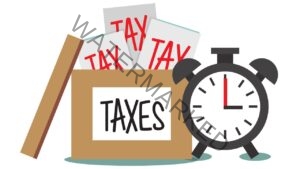INTRODUCTION
These are factors that relate directly to certain type of taxes. The factors trigger tax audits that are specific to those types of taxes. The specific tax audits will be in such tax types as PAYE (employment tax), corporate tax (company tax), and Value Added Tax (VAT).
The factors may trigger tax audits in a single tax type and no other. Tax audits vary in breadth and depth. Specific tax audits tend to be narrow targeting a few taxes but deep since they will examine all aspects of the tax type.
Each tax type has specific triggers that may be unique to the tax. This is because taxes are different. Some taxes are on an agency basis (indirect taxes) while others are paid by the person on whom they are levied (direct taxes).
In both direct and indirect taxes, there is a specific person who is tasked with the responsibility of the taxes. The persons responsible are the ones who are audited.
SOURCES OF TAX AUDIT INFORMATION
Tax audits rely on information. The information availed to the tax authority is used for tax audits. This information that will trigger specific tax audits is from many sources. However, for purposes of this post we will examine two main sources:
- Internal sources – from within the tax authority.
- External sources – from out of the tax authority.
a) Internal Sources
Internal tax information that may impact on tax is normally from the tax authority, for instance, Kenya Revenue Authority (KRA). This information is from the tax records provided by the taxpayer.
The information may also be provided by other taxpayers. Examination of this information may indicate the taxpayer’s non-compliance.
b) External sources
The information will emanate from out of the tax authority. The information is from many sources such as jilted lovers, unhappy spouses, dissatisfied employees, sacked employees etc.
The information may also be from media publicity, insurance claims, whistleblowers and citizens of goodwill. Further, the information may be from the results of educational research, studies by government bodies and research by tax authorities.
Additionally, the information may be from market surveillance by the tax authorities, monitoring by government agencies and scandals in the country such as corruption scandals.
It is important to note that the information is for specific taxes not for all the taxes. This post will address specific factors that may trigger PAYE tax audits.
PAY AS YOU EARN
Pay as You Earn (PAYE) is tax from employment income of directors and employee’s compensation. The tax is deducted from the compensation of directors and employees.
In Kenya, it is the employer who has the responsibility to deduct the tax. Therefore, any PAYE tax audits are audits on the PAYE operations by the employers.
There are proposed PAYE bands and the employers are expected to follow the tax bands when deducting any PAYE. The tax is also expected to be remitted by certain dates.
There are numerous factors from internal and external sources that will trigger PAYE tax audits. The following are some of the factors that are likely to trigger PAYE tax audits:
Employees without PIN
The Kenya government requires that an employer should not make any payments to an employee who does not have a personal identification number (PIN).
In case that happens, the employer is fined. This may trigger a PAYE tax audit to establish how many employees are employed without PIN.
Non-deduction of PAYE
Income of every person who earns employment income is expected to be subjected to PAYE. However, sometimes employers pay compensation without subjecting it to PAYE.
A good example is allowances. This may trigger a PAYE tax audit.
Late PAYE payments
The deducted PAYE is expected to be remitted to the tax authority by a certain date. In case the employer fails to remit the PAYE on time but remits it late, this may also trigger PAYE tax audit.
One of the reasons for late remittance of PAYE is the employer not having money to make the payments.
None payment of PAYE
Some employers may fail to remit PAYE altogether. This may happen when the employer does not have money to pay the PAYE.
In other cases, the employer may also deduct the PAYE and instead of remitting the tax, they may decide to keep the money. This will trigger a PAYE tax audit.
Significant PAYE fluctuations over some time
The normal expectation of an employer’s PAYE operations is that there will be business growth and with it, there will be growth of PAYE due. However, this does not always happen.
When the tax authority discovers that there are significant fluctuations in the PAYE remitted, then this may trigger a tax audit.
Variations between reported PAYE and annual audited accounts
Staff costs that are reported in the annual audited accounts should reconcile with the PAYE reported. However, this does not always happen. There are many reasons for this.
For example, other labour services expenses are not in the payroll. An example is wages. The tax authority may want to establish the actual reason why the figures do not reconcile.
Director’s standard of living
Sometimes the director’s standards of living compared to the PAYE reported are in contrast. The directors may be living a life of luxury yet that does not reflect in their PAYE payments.
For example, information from vehicle, property etc. transactions may indicate otherwise. The tax authorities may want to determine the reasons for the variance through a tax audit.
Senior employees’ compensation
Some company directors compensate their employees more than they earn. In normal circumstances, that should not happen especially in cases where the directors are the owners of the companies.
This may trigger a PAYE tax audit.
Many factors may trigger a PAYE tax audit. However, this post explained a few of those factors. Since the tax industry is dynamic, other factors emerge daily.
OUR CALL! Remember to:
a. SUBSCRIBE to this Website and YouTube Channel – TaxKenya Shows.
b. LIKE videos on our YouTube Channel- TaxKenya Shows.
c. Leave a COMMENT on this Website and YouTube Channel- TaxKenya Shows.
Feel free to send us tax and investments in Kenya questions or topics via email taxkenya@gmail.com that you would wish to be covered in this Website.
Remember to:





